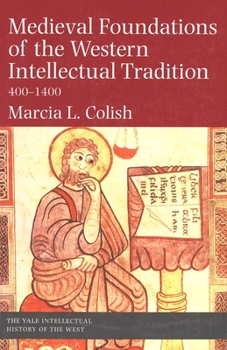Medieval Foundations of the Western Intellectual Tradition
(Part of the Yale Intellectual History of the West Series)
Select Format
Select Condition 
Book Overview
This magisterial book is an analysis of the course of Western intellectual history between A.D. 400 and 1400. The book is arranged in two parts: the first surveys the comparative modes of thought and varying success of Byzantine, Latin-Christian, and Muslim cultures, and the second takes the reader from the eleventh-century revival of learning to the high Middle Ages and beyond, the period in which the vibrancy of Western intellectual culture enabled...
Format:Paperback
Language:English
ISBN:0300078528
ISBN13:9780300078527
Release Date:February 1999
Publisher:Yale University Press
Length:448 Pages
Weight:1.70 lbs.
Dimensions:1.2" x 6.1" x 9.3"
Customer Reviews
3 ratings
Medieval intelectual history
Published by Thriftbooks.com User , 14 years ago
I found this book to be of great help in my understanding of this topic. It covers the full period from begining to end, it outlines all the main players in this field and allows the reader through the biblography to read futher if need be. I would suggest this book be on any reading list for this topic.
Fascinating and well-researched work
Published by Thriftbooks.com User , 23 years ago
Colish's book is a tour-de-force in the Yale Intellectual History of the West. Her thesis, that the foundation of the Western intellectual mindset and tradition really began in earnest in the Middle Ages rathern than Greek antiquity is an interesting one, and one for which I beleive she gives good arguments. The way she suggests that the ideals of Greece were filtered through Rome and Latin Christianity befire they reached "Euorope" as we know it today comes off convincingly. For her, it is a matter of the development of ideas counting for more than their sources; as a historian, she knows that things didn't have to turn out the way that they did. Colish fleshes this out very nicely in the section of the book where she gives an evenhanded and scholarly account of the parallel cultures of the Latin West, Byzantium, and Islam. Her work in this volume shows that she has thought long and hard about these issues, and her conclusions deserve close attention.In addition to her excellent discussion of European Medieval intellectual thought, Colish goes into the vernacular literature and day-to-day culture of the Medieval world and proves again that the "Dark Ages" were anything but in some very important ways. Her treatment of theology in dialogue with Medieval law, science, and literature is nothing less than inspired: as a theologian, I found myself wondering how Colish, a historian, had found the time to track down all the relevant arguements, and how she had been able to explain such byzantine issues as the Nominalist controversy and lay-investiture in so clear a manner. Read this book (not really for beginners) in conjunction with or immediately following Cantor's Civilization in the Middle Ages, and you will have a firm grasp of the entire span of the Medieval era, its ideas, culture, politics, religion, and heritage. A wonderful book.
well-written and informative overview
Published by Thriftbooks.com User , 25 years ago
As an amateur history-enthusiast I greaty enjoyed reading this book (twice) for its well-written and generally clear overview of how Western thought developed throughout early and later medieval periods. Starting with brief discussions of the Apologists and the Latin Church Fathers, the topics raised are discussed in a even-handed manner, although i cannot really judge the treatment of the theological debates. I found the latter (for instance on the Trinity) quite hard-going but that is not necessarily the authors's fault. After all, the subject is complex and deals with theological and philosophical subtleties that now hardly seem to merit the passionate debates and the importance attached to it then. At the same time it is clear that these discussions did have a major impact on European foundations and deeply shaped the further course of Western intellectual thought. The part on vernacular literature (Celtic, Old Norse, German, French and English) i enjoyed very much and i think it really added value. Interesting and useful also was the comparison with Byzantine and Islamic cultures. A very good point was the discussion on diversity that became the hallmark of European civilizations. I sometimes missed the economic/political/social context in which these intellectual developments took place, but again that is not necessarily meant as a criticism. Here one would need to take some other studies which would complement this one. The book sets out to show Medieval roots of Western thought and, i think, it does so very well. Useful and not only for beginners.






